#frontera county
Text
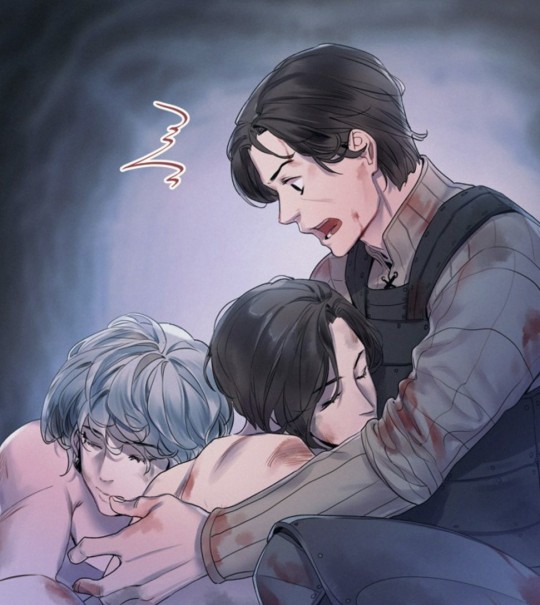


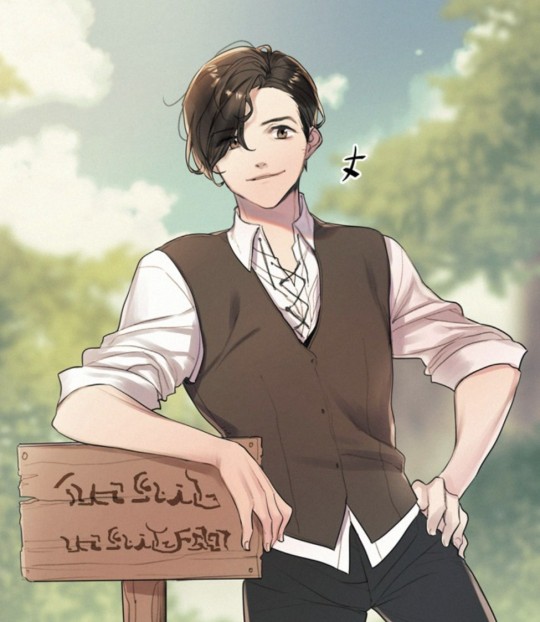





Novel illustrations
#tged#the greatest estate designer#the greatest estate developer spoilers#the greatest estate developer#tged spoiler#tged novel#tged official art#javier asrahan#Ppodong#lloyd frontera#arcos frontera#count frontera#count arcos frontera#tged novel illustration#frontera county#ines ivy reads / watches
983 notes
·
View notes
Note
Broke: spectators at the garden party freaking tf out when bibeong starts dancing
Woke: children and parents alike in the Frontera county delighting in the manticore's giant fluffiness and using him as a playground climbing frame + bug catcher
FOR REAL
"average magentano citizen meets 2 fantastical creatures per year" factoid actualy just statistical error. average magentano citizen meets 0 fantastical creatures per year. the Frontera Estate citizens, who live and work with lloyd frontera and his 5 fluffy babies and other miscellaneous magical beings, are an outlier adn should not have been counted
oh god if the sequel ever has rakiel going to the frontera estate i will break and it will not be pretty you don't understand that's my emotional support territory-
#hey i got an ask#Anonymous#tged#the greatest estate developer#the frontera county people are constantly like 'life is already so goddamn weird this may as well happen'
11 notes
·
View notes
Text
Let's see some of what they have sacrificed (a whole chapter lol I'm almost crying no I'm crying so hard rn I won't shut up about it) for that 'I want to be his friend' (my ass) scene! (I'm only choosing my favorite)
So, only after both of og lloyd and suho were on the train, before og lloyd got reincarnated btw ☺️ so we will see. What we were robbed just for half of chapter.
"Seriously? Are you still sulking?" Lloyd lifted his brow.
"..."
"What? Why? What? Don't look at me like that. Speak."
"..."
Ghost frontera didn't speak. But its gaze at Lloyd was distinctly different from a while ago. There wasn't anger, resentment, frustration, or any of the negative emotions that played across its eyes as it blewoff steam at Lloyd.
The corners of Lloyd's lips rose slightly.
"Hey, you're grateful but embarrassed for getting angry at me earlier, right?"
"..."
"I can see you flinching in guilt."
"Oh, tsk... Come on."
"If you're thankful, just say it. Don't curse me out."
And what's more funny is how suho cares for og lloyd lmao this is the proof that shows us how good person he is. And. You know. Yeah I'd rather not talking about how they portray his character out like that I cannot shut up.
"Hey, tell me if you feel motion sick."
"Why?"
"I'll remove the trap. That way, you can stick your head out and vomit."
"I might as well just kick you out of the trap," growled Ghost Frontera.
"Did you forget already how i beat you up after you tried to do that?"
"No, I didn't, bastard," huffed Ghost Frontera.
"Then let's just go reincarnate like a good boy. Anyway, how do you feel? What does it feel like to be the passenger of this monumental train?"
"Well, nothing much." Ghost Frontera roughly scratched its jaw. "I want to get a drink. It's been a while."
Man...the more I write, the more sad I become when these good things are replaced with something. I don't know, you thought it was boring so you changed it? Even if it's just an unnecessary conversation but you know what? That allows readers to get to know the characters more. Get to know the character's attitude more. And can also relate more to that character...but...sigh. just. Sigh.
So I'm going to share my views on og lloyd right here. Tbh, he's a trash. Yes, he's inherently bad. And some people are just that bad no matter how good their family is. But if you try to analyze it through lloyd's pov on his home and his family. It's another kind. He finds his place boring and he is always dissatisfied with it. But with the little information we've gotten about what he was like when he was very young, and things he's noticed, even he considers them very boring. Of course, even though this bitch is a trash lol I never forgive him for what he had done (like-hate relationship for me and him lol)
Okay so. Hear me out. He did care for his family (*ahem* JAVIER EXCLUDED!!!!) but instead of changing himself he chose to let it be....yeah ykwim🤷♂️ As I've said before, he cares about his family and he knows he shouldn't have done that in the first place. But he was not the one to even say it because he thought he would do it in his next life. What makes you think that he'll do whatever tf he does in the webcomic? Lmao let me grab your collar and have some private discussion!!!
"You're heartless bastard. Don't you miss your family back there?"
"No. My parents all passed away."
Ghost Frontera paused for second before saying, "They say your family is always with you as long as they're in your heart. Cheer up, scumbag."
"What are you saying?" Lloyd frowned with a smile.
"Forget it. What about my parents? Are they well?"
"Of course. They are as healthy as a horse."
"Really?"
"Yeah." Lloyd stared at Frontera. Then he continued in honesty, "Come to think of it, I'm relaying this news late. The Frontera family is no longer a barony."
"What? What do you mean?"
"It's county now."
"Whaaat?" Ghost Frontera's eyes windened.
"Surprising, right? I'm surprised too. Anyway, the count has resumed his hobby recently too."
"Wood carving?"
"Uh-huh. There are a bunch of wooden sculptures in the study already."
"Then what about Mother's garden?"
"It's still there. Oh, it has doubled in size. But I'm slightly worried about the count's back and knees."
"What's up with that old man's back and knees?"
"He's helping out with the gardening. He insists on crouching and giving a hand when he's not used to the work."
"Tsk. I guess the man is still senseless as always."
"Aren't you going to ask about Julian?"
"Don't have to. He's a smart kid, so I'm sure he's doing well on his own."
And ;) they replaced these precious conversation with that. Changed long ass heartwarming conversation into 3 speech bubbles just to sped up the story and ooc'd literally every characters. I'm so okay sir. I'm completely okay.
This is just a part of chapter 243 you know TT you know how much we were robbed right? I am okay right now. It's not like I'm going to talk about how they manage to portray my king hellkaros like that too. Yeah I'm to tally okay with it!
Anyway, it's true that og lloyd cares about his family but, dumbass. he hated javier so much you know lee hyunmin-nim you already have read ch 408 how the hell did you manage to understand that 'wow this guy is actually a good person maybe he even wanted to be friends with javier too!' How????????????? He cared for his family, yes. And javier was there too? No. He's scumbag? Obviously. So he's a good person? NO DUMBASS. LOOK WHAT HE HAVE DONE TO EVERYONE AND TELL ME HOW.
Or are you just not good at writing complex characters? lol Not even mentioning what he was reincarnated as...
Qidjwkwiduiqoq I'm ; ;;; arugh. qidjqkqodk okay sir. well done.
I'll draw og lloyd and suho conversation soon ^^ watch me draw what it supposed to be soon! Watch me!!!!!!!
Also, how the hell again did you think he cared for his estate may i ask some simple question.
#tged#tged spoiler#ch 243#God I love Hell arc so much that I cried#og lloyd frontera#lloyd frontera#kim suho#do you know the reason why I stop here?#you guys...it's better to read the whole arc yourself it's so good^^#i am not dragging myself to talk about hellkaros here or else i'll going insane#i don't care who tf is webcomic hellkaros is now i'm done#the only good webcomic hellkaros has is he's fucking dilf and hot grown ass man that's all#which is i don't even want to think that this mf is my gorgeous hellkaros ofc#i'm totally fine okay??#lol guys read the webnovel please!
25 notes
·
View notes
Text
Okay okay okay. Real thoughts. Real thoughts on the chapter.
First of all. Javier??? 🥺
It hurt.
Javier inadvertently chuckled at the phrase that praised selfless behaviors.
What an outrageous bullcrap.
He could only laugh bitterly, after actually having moved his body to protect someone else and shed blood in his place.
It just hurts. A lot.
Suddenly reminded very strongly that this is a young man in his mid to late 20's who likes fizzy drinks and to tease his friends. Screw Sir Javier, the Knight of Blood and Iron - this is Javier Asrahan, a boy from Frontera County.
And after all that awful contemplation on how pain is just pain, there's nothing noble in it, we get such a beautiful and cool fight scene. He's fighting while completely bleeding out, just desperate to give time for "that fraudster" to run away. "Please." He begs internally, again and again, until he's literally just moving on instinct.
And then Lloyd the sonofabitch gets himself donut-holed right in front of him saying it's "all part of the plan" so "stop crying"???? Motherfu-
Lloyd terrible plan-sharing skills aside, the fact he can smilingly meet his death this time, when in the previous chapter he was nearly having a panic attack? He can put on a brave face for his friend huh.... ? (´°̥̥̥̥̥̥̥̥ω°̥̥̥̥̥̥̥̥`)
And then he dies
This wasn't supposed to happen. Javier was in disbelief. He refused to believe what he saw. This was not the ending he had desired. He desperately cried out.
Javier........
13 notes
·
View notes
Text
¿Cuáles son las mejores playas en la Costa Este para evitar multitudes durante la temporada de vacaciones?
🎰🎲✨ ¡Obtén 500 euros y 200 giros gratis para jugar juegos de casino con solo un clic! ✨🎲🎰
¿Cuáles son las mejores playas en la Costa Este para evitar multitudes durante la temporada de vacaciones?
Playas tranquilas en la Costa Este
La Costa Este de los Estados Unidos es famosa por sus playas vibrantes y concurridas, pero también alberga algunas joyas escondidas que son perfectas para aquellos que buscan tranquilidad y serenidad junto al mar. Estas playas ofrecen un ambiente más relajado y menos concurrido, ideal para quienes desean escapar del bullicio y disfrutar de la belleza natural en paz.
Una de estas playas tranquilas se encuentra en la costa de Delaware, en la región de Sussex County. La playa de Bethany es conocida por su ambiente apacible y su entorno pintoresco. Con kilómetros de arena dorada y aguas cristalinas, es el lugar perfecto para pasear, practicar yoga frente al mar o simplemente relajarse bajo el sol.
Otra opción para los amantes de la tranquilidad es la playa de Assateague Island, que se extiende a lo largo de la frontera entre Maryland y Virginia. Esta playa virgen ofrece paisajes impresionantes y la oportunidad de avistar la vida silvestre, como los famosos caballos salvajes que deambulan libremente por la isla. Los visitantes pueden disfrutar de largas caminatas por la playa, observar aves o incluso acampar bajo las estrellas.
En la costa de Carolina del Norte, la playa de Ocracoke es otro refugio tranquilo que vale la pena explorar. Esta remota isla barrier es accesible solo por ferry, lo que la convierte en un destino menos concurrido y más íntimo. Con sus playas de arena suave y su atmósfera relajada, Ocracoke es el lugar ideal para desconectar del mundo y conectarse con la naturaleza.
Ya sea que estés buscando escapar del estrés diario o simplemente disfrutar de la serenidad del mar, estas playas tranquilas en la Costa Este te ofrecen el refugio perfecto para recargar energías y renovar el espíritu.
Destinos playeros menos concurridos en vacaciones
En muchas ocasiones, durante las vacaciones, la playa suele ser uno de los destinos más populares para relajarse y disfrutar del sol y el mar. Sin embargo, los destinos playeros más concurridos suelen estar abarrotados de turistas, lo que puede restarle encanto a la experiencia. Es por ello que cada vez más personas optan por buscar destinos playeros menos concurridos para disfrutar de unas vacaciones tranquilas y alejadas del bullicio.
Entre los destinos playeros menos concurridos que se pueden encontrar en diferentes partes del mundo se encuentran lugares como Tulum, en México, conocido por sus playas de aguas cristalinas y la majestuosidad de sus ruinas mayas. En Asia, los viajeros pueden optar por visitar las islas de Nusa Penida en Indonesia, un paraíso casi virgen con impresionantes acantilados y aguas turquesas ideales para el snorkel y el buceo.
En Europa, la isla de Milos en Grecia destaca por sus impresionantes formaciones rocosas y playas de aguas transparentes, ideales para los amantes de la fotografía y la tranquilidad. Por otro lado, en Sudamérica, Cabo Polonio en Uruguay es un destino perfecto para quienes buscan desconectar y disfrutar de la naturaleza en su estado puro, con playas solitarias y la posibilidad de avistar lobos marinos en su hábitat natural.
En definitiva, los destinos playeros menos concurridos ofrecen la oportunidad de vivir unas vacaciones auténticas, en contacto con la naturaleza y lejos de las multitudes, permitiendo a los viajeros disfrutar de un merecido descanso en entornos paradisíacos y llenos de encanto.
Lugares remotos para disfrutar del mar en el Este
En el mundo existen lugares remotos en el Este donde se puede disfrutar del mar en su estado más puro y natural. Estos destinos son perfectos para quienes buscan alejarse del bullicio de las ciudades y conectar con la tranquilidad que solo el océano puede brindar.
Uno de estos lugares es la isla de Komodo, en Indonesia. Con sus aguas cristalinas, playas de arena blanca y arrecifes de coral repletos de vida marina, es un paraíso para los amantes del buceo y el snorkel. Además, la isla alberga al famoso dragón de Komodo, una especie única en el mundo que atrae a turistas de todas partes.
Otro destino remoto para disfrutar del mar en el Este es la isla de Palaos, en el océano Pacífico. Con sus más de 500 islas y aguas turquesas llenas de vida marina, es un lugar ideal para la práctica del kayak, el paddleboard y la pesca deportiva. Además, en Palaos se encuentra el famoso Lago de las Medusas, donde se puede nadar con estas fascinantes criaturas sin peligro alguno.
En definitiva, estos lugares remotos en el Este ofrecen una experiencia única para aquellos que buscan desconectar de la rutina y disfrutar de la belleza del mar en todo su esplendor. ¿Te animas a descubrirlos?
Playas apartadas para evitar aglomeraciones
Las playas son destinos turísticos populares durante los meses de calor, pero el exceso de gente puede conducir a aglomeraciones que arruinen la experiencia de relajarse junto al mar. Por suerte, existen playas apartadas que ofrecen la oportunidad de escapar de las multitudes y disfrutar de la tranquilidad y la belleza natural de estos lugares.
Al optar por visitar playas apartadas, los visitantes pueden disfrutar de un entorno más tranquilo y relajado. Estas playas suelen estar menos concurridas, lo que permite a los turistas disfrutar de la serenidad y la paz que ofrecen. Además, al no haber aglomeraciones, se reduce el riesgo de contagio en tiempos de pandemia.
Las playas apartadas suelen ser ideales para aquellos que buscan un refugio tranquilo lejos del bullicio de las playas más concurridas. Estos lugares ofrecen la oportunidad de disfrutar de la naturaleza en su estado más puro y de relajarse en un entorno paradisíaco y poco explorado.
Es importante recordar que al visitar playas apartadas es fundamental respetar el medio ambiente y seguir las normas locales para preservar la belleza natural de estos lugares. Así que si buscas escapar de las multitudes y disfrutar de la paz y la tranquilidad junto al mar, considera visitar alguna de las playas apartadas que el mundo tiene para ofrecer. ¡Tu experiencia será inolvidable!
Rincones paradisíacos sin multitudes en la costa oriental
La costa oriental es conocida por sus hermosos rincones paradisíacos que muchas veces pasan desapercibidos para los turistas que prefieren destinos más concurridos. Sin embargo, aquellos que buscan tranquilidad y belleza natural encuentran en esta costa verdaderos tesoros escondidos.
Uno de estos rincones escondidos es la playa de Aguas Blancas, un paraíso de aguas turquesas y arena blanca que ofrece una experiencia única y relajante. Alejada de las multitudes y el ruido, esta playa invita a disfrutar del sol y el mar en un entorno de paz y tranquilidad.
Otro lugar imperdible en la costa oriental es la cala de San Vicente, un pequeño rincón rodeado de acantilados y vegetación exuberante. Sus aguas cristalinas y su atmósfera serena la convierten en el lugar perfecto para desconectar y disfrutar de la naturaleza en estado puro.
Para los amantes del snorkel y el buceo, la playa de Es Codolar es una excelente opción. Con sus arrecifes de coral y su diversidad de fauna marina, este lugar ofrece una experiencia única para explorar el mundo submarino sin las aglomeraciones de otros destinos más populares.
En definitiva, la costa oriental esconde verdaderos paraísos sin multitudes que invitan a disfrutar de la belleza natural en su estado más puro. Quienes se aventuren a descubrir estos rincones paradisíacos sin duda encontrarán una experiencia inolvidable y llena de magia. ¡Anímate a explorar y enamórate de la costa oriental!
0 notes
Text

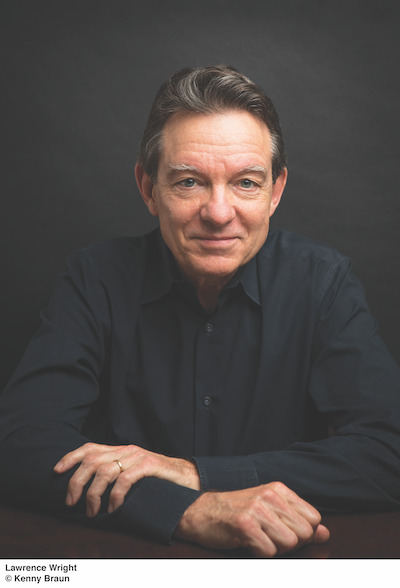
From: Daniel Kusner
Subject: Lawrence wright
Date: September 7, 2015 at 1:29:18 PM CDT
To: "Kusner, Daniel" [email protected]
You could use this: "Austin is already at the center of the bicycling culture, with flatlands on one side and hills on the other, and great weather for cycling. All we need is more bikeways to make it the perfect place for bikes to rule."
Sent from my iPhone
On Sep 7, 2015, at 1:10 PM, Kusner, Daniel [email protected] wrote:

Next Thursday, author Lawrence Wright ("Going Clear: Scientology, Hollywood, and the Prison of Belief.") is coming to Dallas for a reading and signing to promote his newest, “God Save Texas: A Journey Into the Soul of the Lone Star State ” which Knopf releases on April 17.
In Chapter 7, “Big D,” Wright recalls having dinner with Robert Wilonsky. That same chapter, Wright says, “The Dallas Morning News, the most important paper in the state and one of the leading papers in the county."
PDF — 512 CYCOLOGY
PDF new yorker — 1988


Can God Save Texas? A Film God Like Richard Linklater Might Help
One of Texas film's greatest voices speaks on the "cruelty" of the criminal justice system in a new HBO docuseries.
Eva Raggio

Film director Richard Linklater takes a look at the inhumanity of Texas prisons. Mat Hayward/Getty Images for IMDbGod Save Texas, a trilogy of documentaries that debuted Feb. 27 on Max, examines some of the state’s deeply rooted issues. Based on the book God Save Texas: A Journey into the Soul of the Lone Star State by Lawrence Wright, the limited series was made in three parts, each by a different Texas director.
The first, “Hometown Prison,” was directed by Richard Linklater; the second, “The Price of Oil,” by Alex Stapleton; and the third, “La Frontera,” by Ilana Sosa.
Linklater has produced a widely varied body of work, including the highly stylized intellectual favorite Waking Life, the coming-of-age comedy and stoner cult classic Dazed and Confused and indie hits such as School of Rock and Bernie.
Cinephiles are perhaps most sincerely attached to his naturalist masterpieces on time, such as Boyhood — which followed its characters through scenes that took place over 12 years and earned Patricia Arquette a Best Supporting Actress Oscar— and the Before trilogy, in which he surprised viewers with out-of-the-blue sequels, completing a love story through near-voyeuristic glimpses of a couple (played by Julie Delpy and Ethan Hawke) across cities and decades.
We spoke to Linklater via Zoom from Paris, where he's working on a film that’ll keep him away from his adopted hometown of Austin’s SXSW festival — an event he’s hardly missed in two decades. It's nighttime in the City of Lights, and he has Woody Allen's Midnight in Paris and much more on his mind.
For the Austin-based director, dealing with real subjects (including his own mother, Diane Margaret Linklater, a former professor and advocate for inmates) in God Save Texas prompted a different form of investment into his film’s characters.
“I'm always close to my characters, even if I've kind of created them, written them,” Linklater says. “But there's a real actor there. There's a real person you're working with. So in this case, you're working with real people, you're getting their own personal stories. On one hand, it didn't feel that different. I want to have an affection and an understanding for people, but it's personal: It's their lives, it's my life, it's my mom. It couldn't help but be personal. And you're asking others to tell very personal, sometimes painful stories in their own lives.
"So yeah, it's a big ask. But I think in a way, they trusted me because I was local and maybe they knew it was personal for me, but I feel close to every story. You're just trying to tell in the way you feel. So it felt right.”
Intercut with scenes from protests and stories of death row inmates, the film sees Linklater returning to Huntsville, a city 70 miles north of Houston that has the most active death row prison in the U.S. Viewers can practically smell the grease off the small-town diner menus as Linklater reflects with his subjects (many of them his old classmates), on how his hometown’s prison industry grew so wildly out of control — at least tenfold, from 10 prisons to 114 — in the past few decades, and uncovers the inhumanity of inmates' living conditions.
The auteur filmmaker is a proud Texan whose roots creep up in his work. And he maintains the love of home while decrying its systemic failures.
“You're catching me on the wrong night,” he says of his feelings for Texas. “We're executing an innocent guy tomorrow in Huntsville, Ivan Cantu, who's being put to death without … I mean, I can't believe it. I'm just stunned and really depressed, kind of a little desperate. We've been doing all we can. It's just like, gosh, the new normal. OK, we can kill innocent people. The next administration, maybe we can start … There's talk of camps. What's next? What can we put up with?
"So on the one hand, I love Texas and I love the people, but I really do feel a disconnect with the cruelty. ‘Cause I know Texans aren't cruel by and large, but I think our government policies are extremely cruel, and this executing an innocent person is about the top of the list. So I don't know. It's times like this you feel pretty bad.”
Linklater says he didn’t stumble into any major production roadblocks, but taking on a project that required such a deeply personal investment was a matter of facing his past to expose a haunting present.
“Everyone was so giving and open and kind; I think it was just me getting over just wanting to go there myself,” he says. “This film concerns my mom. It's a lot of my own past. I was asking people to tell their stories. So it was just deciding to do it, I think. And I mean, these issues about criminal justice and the death penalty, these have swum around in my head all these years.
“It was kind of cathartic and satisfying to find a home for some of these feelings. And my summation is fairly simple, really. I think after all of it, it's just like, yeah, the death penalty really does hurt a lot of … there's a lot of collateral damage to so many people and these state employees who have to be dragged through it. So to me, it's just kind of unnecessary trauma induced on innocent people.”
The film focuses on the trauma on both sides of the bars, from convicted inmates (many of whom proclaim their innocence) to state workers whose daily duties include strapping the bodies of death row prisoners onto and off the gurney. His opinions on the death penalty haven’t necessarily changed, but Linklater is more adamant than ever that the system predatorily exploits human error for profit, as we idly cede our rights to a state where punishment far too often exceeds the crime.
“My conclusion is don't do it,” he says. “I'm not a full-blown prison abolitionist, but I'm heading that way only in that — I don't mean let murderers out on the streets. I just think we could approach in a much more humane … the way we systematically create all this pain. We could systematically create more worthwhile treatment. I mean, face it, the prisons are full of people in on — it's mental health and drug addiction. If you treated those things, there goes 90% of the population right there.
“And then keep really the psychopaths, the murderers, serial sexual assaulters. I think we all have a vested interest in keeping certain people isolated from the general population, but people who made a bad mistake or something, I can't explain a tenfold increase. Crime is down everywhere. That's just the trend. Violent crime, everything's down. So why is our prison gone up 10 times in the last 40 years? I don't know. Things we have to ask ourselves. ... We should be investing in people, not just punishing them.”
For God Save Texas, he says, the trio of directors hardly compared pre-production notes beforehand.
“We were sort of siloed in our own projects,” Linklater says. “We knew what everybody was doing, but I guess I went first and set a certain tone, maybe with the personal. When we started I don't think we really had a full plan. I was like, ‘Larry [Wright, who also executive-produced the series], so are we gonna go to Huntsville?’ And we just felt our way through it.”
Before and After the Before Trilogy
With his cinematic oeuvre falling into an array of styles and genres, Linklater doesn't give much thought to his overarching body of work, preferring to hyper-focus on each film. He says he hasn’t even pondered the uniting thread woven across his projects.
“I don't know. I'm always telling kind of character-based work,” he says. “The concept is never bigger than the characters. They're pretty far away from superhero or anything like that.”
While his films are often of the deeply felt variety that persist on viewers’ minds long after the credits roll, he also adds: “Or laugh. I've made comedies, a little bit of everything. I don't know, just always trying to express myself in my own relation to the particular story or subject.”
Least of all does he consider his legacy, or his writing living on through the ages.
“Boy, I can tell you, I never think I'll live on for generations,” he says with a laugh. “I'm really focused on what I'm doing like right now, making this movie. So that's really all you can do.”
He concedes that he's mildly aware the Before movies have prompted a niche form of tourism, made up of fans who visit the first film’s Vienna locations, for example. But he hasn’t been to Vienna in about 15 years and assumes the interest has dwindled. (It hasn’t; visit the record shop where Jesse and Celine share a charged exchange of awkward missed glances in a listening booth, and see for yourself.) He laughs at our joke suggesting the Austrian capital should’ve given him a key to the city.
Nonetheless, as he finds himself in Paris, Linklater has learned that the bookstore featured in the second installment, Before Sunset, is still a bit of a treasure for fans following the Before map.
In Huntsville, he’s known as “Rick,” a former football player for the state’s highest-ranking team. As a young adult, he self-taught filmmaking on a Super 8 camera. Before long, Rick went on to receive Academy Award nominations, be named one of Time’s most influential people in the world in 2015, and become an advocate for filmmaking, and particularly Texas filmmaking, as co-founder of the Austin Film Society.
He's a successful independent filmmaker whose movies have made a crater-sized mark on pop culture, so one would assume Linklater finds himself in a privileged spot coveted by any artist looking to make an impact without the fine print double-dealings.
“Successful? I don't know. It doesn't feel that way all the time when you're working on a real low budget and you don't have enough time or money to make your movie,” he says. “But maybe that's it. I've just never cared about, I guess, the money or that result. I've really just focused on the next story I'm trying to tell and kind of avoided a certain kind of careerist trappings. Maybe staying in Texas probably was a good thing for my mental health.”
It hasn’t been hard, he says, to sustain that balance, keeping a sense of artistic autonomy while avoiding industry money grabs and other Hollywood pitfalls.
“You say no a lot," he says. "I think you define yourself a lot in this world — it sounds corny or maybe you heard it: It's like you kind of define yourself by what you don't do. Just because you have opportunities doesn't mean you have to do it. So the things I've turned down, the things I've not wanted to do that I could have, kind of defined you. It's like, yeah, no, I'm really focused over here. I know that's more money and that [I’ll] get to work with some big star, but I don't really want to do that. I want to tell [my stories]. So just follow your own muse.”
During the pandemic, his kids became an elite audience in a Linklater-selected, at-home film festival. He was glad they’d grown past the animated children’s movie days (“I could not wait to get out of kid movies. We did that pretty quick. I'm a filmmaker, I was showing them stuff, but yeah, I could not wait until they were starting to ask me more about movies”) and into more sophisticated cinematic territory.
“Say what you will, the pandemic was terrible, but we watched a movie every night,” he says. “These teenagers [would ask], ‘What movie are you going to watch now? Let's do the French New Wave, or let's watch films from Brazil.’ It was like my own little one-year curation, my own little film society in the family.”
For all the brilliant dialogue that mark his own films, the uniting thread he never thinks about, Linklater isn’t surprised that the most quoted line from his movies was famously ad-libbed by Matthew McConaughey in Dazed and Confused.
“He wasn't even scheduled to work that night,” he says of his fellow Texan. “We worked up that scene and he just threw in that 'All right, all right, all right’ — he said that as he was driving in, and I thought it was really funny."
Linklater remembers that "within a day or two after that," the expression became a popular saying among the film crew.
"I noticed a key grip say, ‘OK, we're laying some dolly track over there. Let's go do that. And [he] goes, ‘All right, all right, all right, all right.' He was already repeating it," Linklater says. " And on one hand, I'm not surprised. I mean, of course you're surprised when you see a T-shirt with it or something like that, that's crazy.
“Matthew … he's earned it, I guess.”
click to enlarge
A new HBO docuseries finds Austin director Richard Linklater visiting his hometown to examine a universal issue: the ever-expanding prison industry.
Max/Richard Linklater
newyorker.com
In “Hometown Prison,” Richard Linklater Looks at Life on Both Sides of the Wall
Richard Brody
8–11 minutes
With little fanfare, a complex and far-reaching personal documentary by Richard Linklater, “Hometown Prison,” dropped last week on the streaming service Max. It’s one of a trio of excellent films made under the rubric “God Save Texas,” based on the book by Lawrence Wright, of this publication—all of which consider the state’s history and politics in the light of the filmmakers’ own lives and families. The second film, “The Price of Oil,” directed by the seventh-generation Texan Alex Stapleton, traces the economic racism on which the state’s oil industry was built, as manifested in its disproportionate pollution of predominantly Black neighborhoods, including her family’s own. The third, “La Frontera,” by Iliana Sosa, who was born in El Paso to a family of Mexican descent, considers the historical unity of that city with its Mexican neighbor, Ciudad Juárez, and the enduring burdens imposed on Mexican Americans by white supremacy and the resulting militarized border. It takes nothing away from these latter films—exemplary blends of journalistic investigation, historical analysis, and intimate experience—to call particular attention to the power and the aesthetic range of Linklater’s documentary, which combines a narrow focus on a single institution with a conjoined exploration of the director’s life and his œuvre.
“Hometown Prison” is about Huntsville, Texas, where Linklater lived from 1970 (the year he turned ten) to 1981. He has previously explored his boyhood experiences there in such films as “Dazed and Confused,” “Everybody Wants Some!!,” and, of course, “Boyhood.” However, “Hometown Prison” concentrates on one oppressive peculiarity of the town: there’s a large prison in the middle of it, in plain view of much of daily life there, and a vast network of prisons spread throughout the town and its vicinity. The prison system is the town’s main employer. Texas, as Linklater relates, has the most incarcerated people of any state; it also executes more people than any other state, and those executions take place in Huntsville. Prisons, in other words, are a ubiquitous presence in Huntsville’s landscape, and yet, Linklater says, “At some point, you don’t really even see it.” In “Hometown Prison,” he attempts to see—and to give voice to silences on the subject, in his life and his work, that he has until now not managed to break.
It wasn’t for lack of trying. Though Linklater credits Wright (one of the filmmaker’s longtime friends, who appears on camera, as he does in the other two films in the series) with the suggestion to make “Hometown Prison,” the work is anchored in two incomplete projects of Linklater’s. The first, a drama that he’d hoped to make in 2002, was about two high-school football players who, a year after graduation, end up on opposite sides of the prison walls. The second was to have been made from documentary footage that he shot in 2003, of protests outside those walls, when an inmate named Delma Banks, Jr., was about to be executed despite abundant evidence of his innocence. Linklater couldn’t find funding for the drama and never did anything with the footage—plentiful amounts of which appear in “Hometown Prison.”
Here, Linklater breaks silence in the most direct and literal way—by speaking. He delivers a copious and confessional voice-over, complete with reminiscences, observations distilled from research, and candid assertions (as when he declares capital punishment “barbaric”). He also appears on camera, in conversation with Huntsville residents whose lives intersect with his and with the town’s carceral economy. Linklater’s recollections of his late mother, Diane (included by way of a talk with one of her friends), involve her activism on behalf of incarcerated people released into town with no support. One of the most revealing exchanges is with Elroy Thomas, a manager at a Huntsville bus depot, who estimates that, in his thirty years on the job, he has sold one-way tickets out of town to hundreds of thousands of newly released prisoners—and adds that, in the process, he has become acutely sensitive to their frame of mind and the extent of the preparedness to return to private life. It’s shocking to see a line of former inmates walking casually away from prison with no clear destination down the closed-off vista of a leafy street. “They don’t offer no rehabilitation,” one of them comments. “If you’re trying to get right, you need to do it on your own.”
Among the ex-prisoners with whom Linklater speaks is Dale Enderlin, one of his former baseball teammates from Huntsville’s Sam Houston State University, where Linklater’s mother taught. (The team was later the subject of “Everybody Wants Some!!”) Enderlin spent thirty-nine months in prison for white-collar crimes, and his main observation from his time there is how routinely young, nonwhite people are railroaded into confessions for crimes that they didn’t commit. A civil-rights lawyer, Bill Habern, who arrived in town as a public defender in the nineteen-seventies, dated Linklater’s mother, and remained a family friend, says, “I came to Huntsville and I thought I’d landed in Mississippi twenty years before.” He shows Linklater bullet holes in his home, estimating that there are twelve to fifteen. Ed Owens, the first Black warden of a Huntsville prison, says that he experienced far more racism owing to his work inside the walls than to anything in ordinary town life; during protests involving one execution, the Ku Klux Klan demonstrated outside his house.
A prison in Huntsville, Texas.
The attitudes of many Sam Houston students interviewed in the documentary belie the centrality of prison to life in Huntsville. Despite being on a campus with clear views of uniformed prison guards, inmates being released, and demonstrations against capital punishment, they claim not to pay much attention to the facility’s proximity. “I’ve never given too much thought to it, until you hear the siren go off,” one student says. Another notes, “It seems that everyone’s aware of it, but no one wants to talk about it”; a third adds, “I’ve never heard no professor talk about it.” Linklater affirms that the “disconnect” is “kind of a Huntsville tradition.” One of his former high-school football teammates says that, even now, the prison “doesn’t even come to my consciousness.”
Of course, there are some in Huntsville for whom the prison system looms large. Linklater interviews many of them: the formerly incarcerated, and family members of the incarcerated; a local historian and activist who seeks to change the town’s civic life and is well aware of being despised for it; former corrections officials, whose firsthand experiences witnessing or even participating in executions has caused them to reject the practice; and a current one who finds the rigors of the carceral system hard to bear. Moreover, Linklater recalls one of his stepfathers, a prison guard (whom he dramatized in “Boyhood”) whom the stresses of the prison system psychologically warped and darkened.
Just a few minutes into “Hometown Prison,” there’s a shot of a restaurant across the road from a barbed-wire-fenced prison unit, which has a cheerful sign announcing “Sunday: Kids Eat Free.” I was reminded of another movie in current release, Jonathan Glazer’s historical drama “The Zone of Interest,” which is set outside the walls of Auschwitz, in a house where the camp’s commandant, Rudolf Höss; his wife, Hedwig; and their three young children live, apparently pretending, to the fullest of their capacities, that their lives are normal. Unlike Glazer, Linklater doesn’t merely observe Huntsville residents’ lives alongside prison but also hears from them. He displays deep and sincere curiosity about what people involved in a cruel system—or even merely living in view of one—say, think, and feel. He probes the psychology of their efforts to keep prison from their minds and also considers the ideologies behind the prevalence of incarceration and the death penalty in Texas—including racism, class-based inequity, an enduring myth of frontier justice, brazen demagogy, and a form of Christian fundamentalism that emphasizes strictness rather than mercy—as well as the practical policies that sustain the carceral system there, including the economic motives of contracts for businesses and employment for residents.
“Hometown Prison,” with its free and hybrid form, empathetically and indignantly brings suppressed agonies to light. It does more, too. Linklater looks deeply at the town’s self-gaslighting, at how it’s maintained and who maintains it, and to what ends. The film is a fervent and trenchant work of political psychology, living history, investigative journalism, and anguished confession.
With humor and the biting insight of a native, the Pulitzer Prize-winning author Lawrence explores the history, culture, and politics of Texas, while holding the stereotypes up for rigorous scrutiny.
God Save Texas (Penguin, 2018) is a journey through the most controversial state in America. It is a red state in the heart of Trumpland that hasn’t elected a Democrat to a statewide office in more than twenty years; but it is also a state in which minorities already form a majority (including the largest number of Muslims). The cities are blue and among the most diverse in the nation. Oil is still king but Texas now leads California in technology exports. The Texas economic model of low taxes and minimal regulation has produced extraordinary growth but also striking income disparities. Texas looks a lot like the America that Donald Trump wants to create. And Wright’s profound portrait of the state not only reflects our country back as it is, but as it was and as it might be.
Lawrence Wright is a staff writer for The New Yorker and the author of nine previous books of nonfiction, including In the New World, Remembering Satan, The Looming Tower, Going Clear, Thirteen Days in September, and The Terror Years,and one novel, God’s Favorite. His books have received many prizes and honors, including a Pulitzer Prize for The Looming Tower. He is also a playwright and screenwriter. He is a longtime resident of Austin.
A light reception will precede the event beginning at 5:30 pm, with the lecture starting at 6:00 pm. Parking will be available on the SMU campus. FREE passes will be emailed to registered guests before the event. Seating is limited, and not guaranteed.
Wright's publication of the same title will be available for purchase and signing after the event.
TEACHERS ONLY -- Please sign in at the registration table to receive continuing education credit.
Co-sponsored with SMU's Clements Center for Southwest Studies, Center for Presidential History, the John Tower Center for Political Studies, the Clements Department of History, the Dedman College Interdisiplinary Institute, and Dedman College of Humanities and Sciences.
-- Southern Methodist University
0 notes
Text
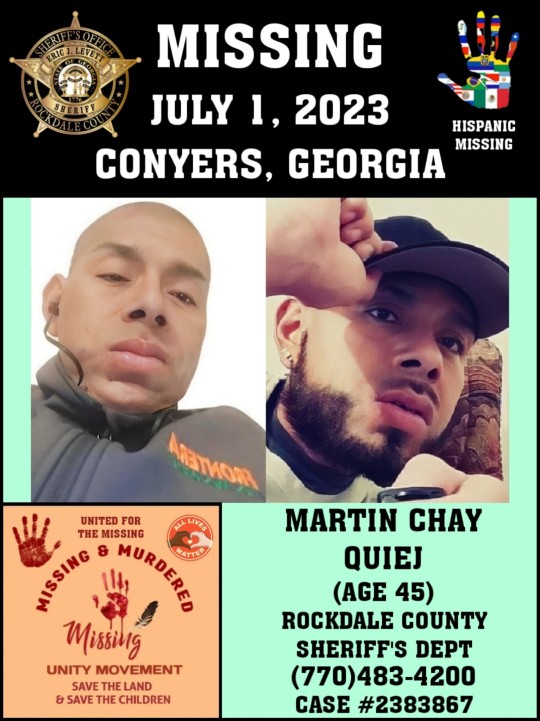
EVERYONE PLEASE SHARE
MISSING
MARTIN CHAY QUIEJ (AGE 45)
JULY 1, 2023
CONYERS, GEORGIA
Rockdale County Sheriff’s Department is seeking assistance with locating a missing man.
Martin Chay Quiej, 45 years-of-age, has been
missing since July 1, 2023 when he went to work at Frontera Restaurant in Conyers, Georgia. He left work and has not been seen since.
He is described as a Hispanic male, 5'5", approximately 150-175 lbs, with short black hair and brown eyes.
Martin has a tattoo that says "MARTIN CHAY QUIEJ." He is missing his front top tooth. He also has a scar near his mouth.
Anyone with any information please contact:
ROCKDALE COUNTY SHERIFF'S DEPARTMENT
(770)483-4200
CASE #2383867
https://www.tudn.com/hispano-desaparecido-conyers-georgia-martin-chay
&
https://medium.com/@MissingAdvocate72/everyone-please-share-22770cf8d1f8
#MissingAndMurderedUnityMovement & #MissingPersons & #HispanicMissing & #MartinChayQuiej & #ConyersGeorgia & #AtlantaGeorgia & #GeorgiaUSA & #USA & #Unity & #Nationwide & #Viral
0 notes
Text
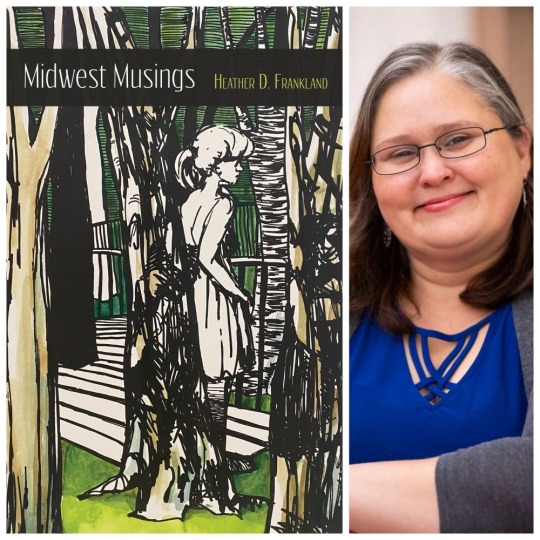
NEW FROM FINISHING LINE PRESS: Midwest Musings by Heather D. Frankland
On SALE now! Pre-order Price Guarantee: https://www.finishinglinepress.com/product/midwest-musings-by-heather-d-frankland/
RESERVE YOUR COPY TODAY
Midwest Musings is about the inspiration and the confusion of #home, the roots that anchor, and the scattered thoughts on place and identity that escape definition. The #poems in this #chapbook find magic in the mundane, whether that be in recounting an old story or loving a creek or saving a luna moth. In the end, the poems come to a realization that no matter where you move, the regional roots of home run deep. They run so deep that they tangle in the soil of the self.
Originally from Muncie, Indiana, Heather Frankland currently lives in Silver City, NM where she teaches at Western New Mexico University. She holds both a MPH and an MFA from New Mexico State University and a BA from Knox College. She served in the Peace Corps and Peace Corps Response Volunteer in Peru and Panama. Heather finds herself intrigued by landscapes and the role they can play in language, story, and poetry. She has been published in ROAR, Plane Tree Journal, Sin Fronteras Press, Sweet Lit, Slippery Elm Literary Journal, and others.
PRAISE FOR Midwest Musings by Heather D. Frankland
As fearlessly self-examining as Heather Frankland’s poems are, they are also elusively stoic and emboldened to hold intimate knowledge of the world–and her relations with others–sacred. Through her exploration of opposing desires to wild or to tame, to teach or to unlearn, to hide or to draw out, to welcome or to warn, to love or to withhold love, or to thirst or to deluge, these dazzling contradictions have been deftly honed into tantalizing poem-secrets.
–Richard Greenfield, author of Subterranean.
“I will drench you awake,” Heather Frankland promises, and she does with poems of place and nature that also track the wildness, settled-ness, and sometime wilderness of girlhood and womanhood. From poems to her grandmother that celebrate grit and silence to poems that trace the subversive power of herself as a young woman, Frankland’s poems manage the rare trick of balancing love and family with the tougher territories of alienation and grief in a way that feels earned, authentic, and surprising. “But I am a girl hiding in the field/I am creating a. map of the best places to hide,” she tells us, and we believe her. This is a book to hold in your heart.
–Sheila Black, author of Radium Dream.
Frankland’s unique voice brings the ordinary alive. Her keen observations are revealing and honest.
–Elise Stuart, author of My Mother and I, We Talk Cat, and Poet Laureate Emerita of Silver City and Grant County.
Heather Frankland writes thoughtful poems that exhibit a strong sense of place and an equally strong compassion for people alive and dead, animals, even a moth and a creek. She examines herself with an equally keen eye, her feelings, her attachments, her mistakes, her pretensions. These are non pretentious poems that seek wisdom and often find it.
–Marge Piercy author of 20 poetry books, most recently On the Way Out, Turn Off the Light, 17 novels, short stories, and 5 nonfiction books.
Please share/repost #flpauthor #preorder #AwesomeCoverArt #read #poems #literature #poetry #home #chapbook
1 note
·
View note
Text
Newsom visita el centro de apoyo a los inmigrantes financiado por el estado de California - Los Angeles Times
Newsom visita el centro de apoyo a los inmigrantes financiado por el estado de California – Los Angeles Times
IMPERIAL COUNTY —
Durante una visita a un centro de inmigrantes financiado por el estado que presta servicios a solicitantes de asilo cerca de la frontera del condado Imperial con México, el gobernador Gavin Newsom criticó a los republicanos del Congreso por politizar la inmigración y no apoyar reformas completas.
Debido a la falta de apoyo federal, el gobernador dijo que el estado ha gastado…
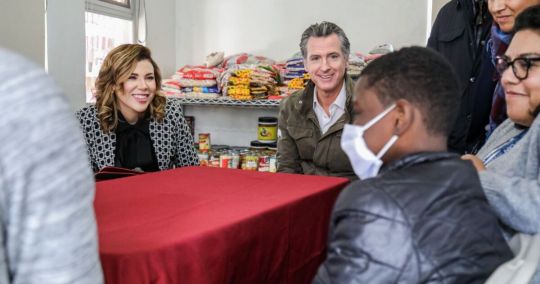
View On WordPress
0 notes
Text
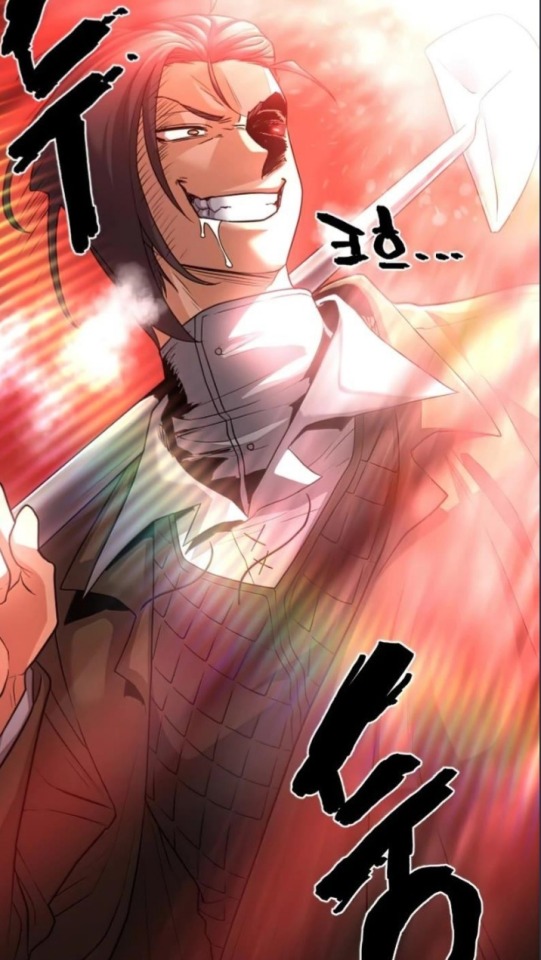
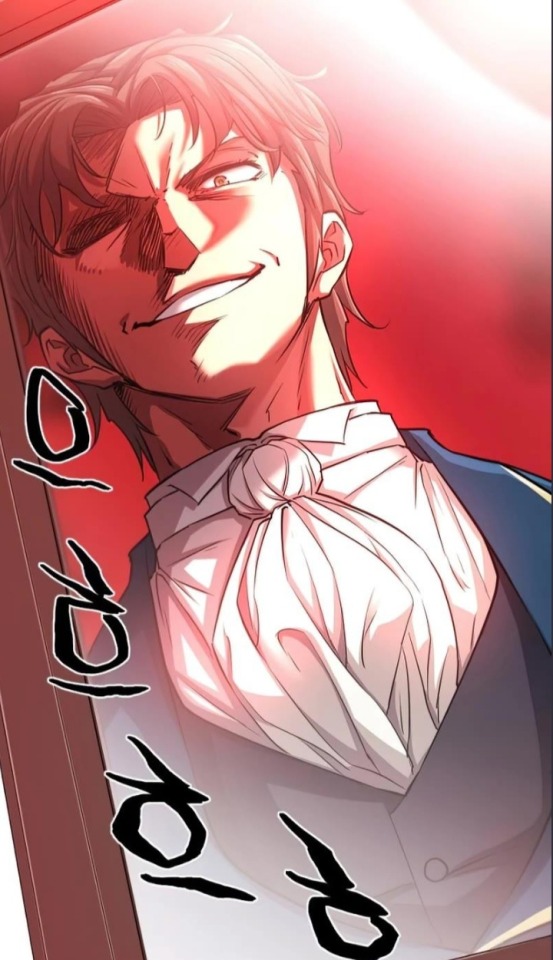
Like father like son
#baron#barony#lloyd frontera#arcos frontera#count frontera#(previously known as baron arcos frontera)#frontera county#tged#tged spoiler#tged webtoon#the greatest estate developer spoilers#the greatest estate developer#the greatest estate designer#frontera family#frontera territory#Tagging it like that cause idk when they are gonna get new rank again#I alredy was using baron / barony tags so rip#Now it's Count and county 🤷🏻♀️#count arcos frontera
330 notes
·
View notes
Note
does javier want to continue working construction? i mean i think in the novel he is simply doing it because lloyd asks him/is needed but he doesn't really like it? would he do it if let's say alicia calls on lloyd again for future construction projects? this is in a world that lloyd and alicia never got married and lloyd just comes home at the frontera county
already answered a similar ask before! but yes, i do think javier would continue working in construction if lloyd asked him to.
javier has quite literally followed him to hell and back, fought angels and demons for him and then annoyed the most powerful being on the mortal realm into opening a cross-dimensional portal to get to lloyd. like i said before, there is very little that javier wouldn't do for lloyd by the end of the novel.
i think continue working in construction would be like. a non issue. if it means he can stay near lloyd at all times. he'd complain about it and lloyd would bully him into doing it, but that's just how they have fun laskdklsfds
#hey i got an ask#Anonymous#tged#the greatest estate developer#javier asrahan#lloyd frontera#llojavi
33 notes
·
View notes
Note
What if Lloyd gets to stay in the Frontera fiefdom and a few years passed already until suddenly a new wave of monsters or war are happening at the far side of the kingdom and Alicia is calling all knights and soldiers would you think Javier would participate here and leave?
OHHH so many juicy thought experiments today!!
Now keep in mind that I havent gotten to the end of the novel (just read ch 370/408 today in fact), so there may be future events that may change my mind BUT WITH THAT CAVEAT OUT OF THE WAY-
Honestly? If Queen Alicia is at the point of calling up Javier for reinforcement, it must be pretty damn bad. Strategically, Javier is the equivalent of a nuclear fucking bomb.
Swordmasters were so important that the mere presence of one deterred invasions from other nations, and the presence of several even outshines the strength of a regional military.
Javier isn't a swordmaster. He's a grandmaster. If you want to use your nuke, you need to take it away from elsewhere. So the border of the Sultan kingdom would be potentially open to attacks with the biggest threat moved away. It may behoove the Queen to leave Javier behind as a giant defensive wall to cover her back as she attacks the front lines with literally everything else.
Buuuuuuut. If she thought she needed Javier... he does have a fast ride to finish things quickly - Draggy. A grandmaster and a bone dragon arriving at bullet speed would be quite the blow to any amount of monsters. And goodness, Lloyd can't just let Javier take Draggy out without him, he'd better join on the strategy side too (lol).
If the question was about Javier's loyalty, we already know that Javier will disobey the Queen to stay with the Frontera's. The struggle of the people on the other side of the kingdom may pain him, but... Javier may be an excellent and noble knight, but he's loyal to one family only, and that family is not where the peril is.
(Maybe he'd try to convince Lloyd to have the Frontera's join the cause? But he wouldn't leave without either Arcos or Lloyd telling him to, no matter what the Queen demands.)
If you're looking for juicy drama due to Javier being called away, you may want to set your scene before he becomes a grandmaster and Draggy joining. For that delicious angst about power level differences ;3c Javier has already rebuffed the Queen nearly the moment we meet her, but if the County doesn't have enough of a reputation in the story yet, the Frontera's might not have a choice but give up Javier in an emergency.
#juicy thoughts! oh the drama#ohhhhhh the POLITICS of a monster domino happening OPPOSITE of the Sultan kingdom#the sultan kingdom were the cause of the last one - it makes sense another kingdom may have followed their example!#and the sultan kingdom COULD take advantage and attack BUT. Sheherazade is now married into the family across the way :)#so its less ideal#instead they could bolster their reputation by acting as defenders while the Magentano kingdom is busy#show off you kept the treaty and make the magentano kingdom thankful for the help#om nom nom mmmmmm politics#tged
10 notes
·
View notes
Text
Lizelle Herrera remains in the custody of the Starr County Sheriff’s Office with bond set at $500,000.
Members of the La Frontera Fund, a Rio Grande Valley-based abortion assistance fund, protested Saturday morning outside the Starr County Jail.
“This arrest is inhumane. We are demanding the immediate release of Lizelle Herrera." said Rockie Gonzalez, founder and board chair of Frontera Fund. “What is alleged is that she was in the hospital and had a miscarriage and divulged some information to hospital staff, who then reported her to the police.”
“This is a developing story and we don’t yet know all the details surrounding this tragic event, what we do know is that criminalizing pregnant people’s choices or pregnancy outcomes, which the state of Texas has done, takes away people’s autonomy over their own bodies, and leaves them with no safe options when they choose not to become a parent,” Gonzalez explained.
In September, Texas lawmakers passed Senate Bill 8, which bans the procedure as early as six weeks into a pregnancy — often before many people realize they're pregnant.
SB 8, the most restrictive ban on the procedure in the country, deputizes private citizens to sue anyone who performs an abortion or “aids and abets” a procedure.
As legal challenges make their way through the courts, thousands of Texans have gone out of state to get abortions.
6 notes
·
View notes
Text
Weekend Edition: Latinx Memoirs
This weekend we’re taking a look at memoirs by Latinx authors. There are many titles to choose from right here at OCL, but don’t forget that you can also check out books through OhioLINK and SearchOhio for even more options.
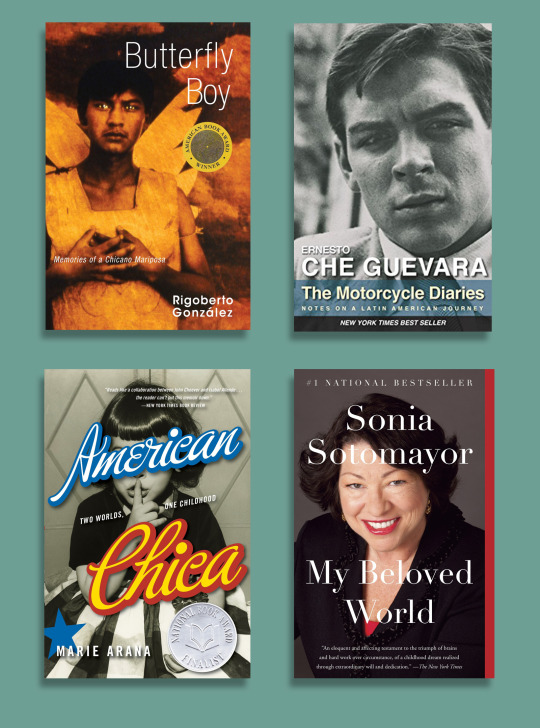
Butterfly Boy: Memories of a Chicano Mariposa by Rigoberto González
Heartbreaking, poetic, and intensely personal, this is a unique coming-out and coming-of-age story of a first-generation Chicano who trades one life for another, only to discover that history and memory are not exchangeable or forgettable. Growing up among poor migrant Mexican farmworkers, Gonzaĺez also faces the pressure of coming-of-age as a gay man in a culture that prizes machismo. Losing his mother when he is twelve, Gonzaĺez must then confront his father's abandonment and an abiding sense of cultural estrangement. His only sense of connection gets forged in a violent relationship with an older man. By finding his calling as a writer, and by revisiting the relationship with his father during a trip to Mexico, Gonzaĺez finally claims his identity at the intersection of race, class, and sexuality. The result is a leap of faith that every reader who ever felt like an outsider will immediately recognize.--From publisher description
The Motorcycle Diaries by Ernesto Che Guevara
The diaries written by Che Guevara during his riotous motorcycle odyssey around South America at the age of twenty-three.
American Chica: Two Worlds, One Childhood by Maria Arana
From her father's genteel Peruvian family, Marie Arana was taught to be a proper lady, yet from her mother's American family she learned to shoot a gun, break a horse, and snap a chicken's neck for dinner. Arana shuttled easily between these deeply separate cultures for years. But only when she immigrated with her family to the United States did she come to understand that she was a hybrid American, an individual whose cultural identity was split in half. Coming to terms with this split is at the heart of this graceful, beautifully realized portrait of a child who "was a north-south collision, a New World fusion. An Americanchica." Through Arana's eyes the reader will discover not only the diverse, earthquake-prone terrain of Peru, charged with ghosts of history and mythology, but also the vast prairie lands of Wyoming, "grave-slab flat," and hemmed by mountains. In these landscapes resides a fierce and colorful cast of family members who bring herhistoriavividly to life, among them Arana's proud paternal grandfather, Victor Manuel Arana Sobrevilla, who one day simply stopped coming down the stairs; her dazzling maternal grandmother, Rosa Cisneros y Cisneros, "clicking through the house as if she were making her way onstage"; Grandpa Doc, her maternal grandfather, who, by example, taught her about the constancy of love. But most important are Arana's parents, Jorge and Marie. He a brilliant engineer, she a talented musician. For more than half a century these two passionate, strong-willed people struggled to overcome the bicultural tensions in their marriage and, finally, to prevail.
My Beloved World by Sonia Sotomayor
The first Hispanic and third woman appointed to the United States Supreme Court, Sonia Sotomayor has become an instant American icon. Now, with a candor and intimacy never undertaken by a sitting Justice, she recounts her life from a Bronx housing project to the federal bench, a journey that offers an inspiring testament to her own extraordinary determination and the power of believing in oneself. Here is the story of a precarious childhood, with an alcoholic father (who would die when she was nine) and a devoted but overburdened mother, and of the refuge a little girl took from the turmoil at home with her passionately spirited paternal grandmother. But it was when she was diagnosed with juvenile diabetes that the precocious Sonia recognized she must ultimately depend on herself. She would learn to give herself the insulin shots she needed to survive and soon imagined a path to a different life. With only television characters for her professional role models, and little understanding of what was involved, she determined to become a lawyer, a dream that would sustain her on an unlikely course, from valedictorian of her high school class to the highest honors at Princeton, Yale Law School, the New York County District Attorney's office, private practice, and appointment to the Federal District Court before the age of forty. Along the way we see how she was shaped by her invaluable mentors, a failed marriage, and the modern version of extended family she has created from cherished friends and their children. Through her still-astonished eyes, America's infinite possibilities are envisioned anew in this warm and honest book, destined to become a classic of self-invention and self-discovery.
La Distancia Entre Nosotros by Reyna Grande
"Cuando el padre de Reyna Grande deja a su esposa y sus tres hijos atrás en un pueblo de México para hacer el peligroso viaje a través de la frontera a los Estados Unidos, promete que pronto regresará; con el dinero suficiente para construir la casa de sus sueños. Sus promesas se vuelven más difíciles de creer cuando los meses de espera se convierten en años. Cuando se lleva a su esposa para reunirse con él, Reyna y sus hermanos son depositados en el hogar ya sobrecargado de su abuela paterna, Evila, una mujer endurecida por la vida. Los tres hermanos se ven obligados a cuidar de sí mismos. En los juegos infantiles encuentran una manera de olvidar el dolor del abandono y a resolver problemas de adultos. Cuando su madre regresa, la reunión sienta las bases para un capítulo nuevo y dramático en la vida de Reyna: su propio viaje a El otro lado para vivir con el hombre que ha poseído su imaginación durante años-- su padre ausente."--Book cover
In the Country We Love: My Family Divided by Diane Guerrero ; with Michelle Burford
“ Diane Guerrero, the television actress from the megahit Orange is the New Black and Jane the Virgin, was just fourteen years old on the day her parents and brother were arrested and deported to Colombia while she was at school. Born in the U.S., Guerrero was able to remain in the country and continue her education, depending on the kindness of family friends who took her in and helped her build a life and a successful acting career for herself, without the support system of her family. In the Country We Love is a moving, heartbreaking story of one woman's extraordinary resilience in the face of the nightmarish struggles of undocumented residents in this country. There are over 11 million undocumented immigrants living in the US, many of whom have citizen children, whose lives here are just as precarious, and whose stories haven't been told. Written with Michelle Burford, this memoir is a tale of personal triumph that also casts a much-needed light on the fears that haunt the daily existence of families likes the author's and on a system that fails them over and over"-- Provided by publisher
When I Was Puerto Rican by Esmeralda Santiago
[The author's] story begins in rural Puerto Rico, where her warring parents and seven siblings led a life of uproar, but one full of love and tenderness as well. Growing up, Esmeralda learned the proper way to eat a guava, the sound of the tree frogs in the mango groves at night, the taste of the delectable sausage called morcilla, and the formula for ushering a dead baby's soul to heaven. But just when Esmeralda seemed to have learned everything, she was taken to New York City, where the rules - and the language - were bewilderingly different. How Esmeralda overcame adversity, won acceptance to New York City's High School of Performing Arts, and then went on to Harvard, where she graduated with highest honors, is a record of a tremendous journey by a truly remarkable woman.-BooksInPrint.
#oberlin college libraries#oberlin college#OCLReads#OCL Reading Challenge#Reading Challenge#Book Bingo#Latinx Memoir#Latinx Biography
14 notes
·
View notes
Text
Sharing links to join/support leftist organizations is about a million times more useful than the wall of "YOU HAVE TO VOTE BIDEN OR YOU ARE PERSONALLY RESPONSIBLE FOR FASCISM!!!!" that I've been seeing over the past hour.
So anyway, here's a list.
EDIT: Yes, you can add to this with your local orgs! This list is very USA and Florida based because that’s where I’m located, but if you’ve got a good organization to boost, please do!!
ORGS & VENUES:
The Civic Media Center - Florida-based infoshop & organizing hub - https://www.civicmediacenter.org/
Madres Sin Fronteras - Mothers Without Borders - Florida-based immigrant justice & welfare - Madres Sin Fronteras
Strive: Socialist Trans Initiative - Florida-based socialist trans org - Strive
Socialist Alternative - National socialist organizing - https://www.socialistalternative.org/
ACT UP - HIV/AIDS & Queer activism - https://actupny.com/
Food Not Bombs - http://foodnotbombs.net/new_site/
Dream Defenders - anti-prison and anti-police-brutality activists - https://www.dreamdefenders.org/
Death & the Maiden - leftist deathcare & advocacy - https://deadmaidens.com/
UNIONS:
Industrial Workers of the World - https://www.iww.org/
International Alliance of Theatrical Stage Employees - https://www.iatse.net/
National Education Association - http://www.nea.org/
United Steelworkers - https://www.usw.org/
American Federation of State, County and Municipal Employees - https://www.afscme.org/
Service Employees International Union - https://www.seiu.org/about
International Union, United Automobile, Aerospace and Agricultural Implement Workers of America - https://www.uaw.org/
International Brotherhood of Electrical Workers - http://www.ibew.org/
140 notes
·
View notes
Video
Dana Martin, 31, a Black transgender woman, was fatally shot in Montgomery, Alabama. Daroneshia Duncan-Boyd, an Alabama-based trans advocate, said “she was a person that was loved by many.”
Jazzaline Ware, 34, a Black transgender woman, was found dead in her Memphis apartment. Her death is being investigated as a homicide, according to The Advocate. “Our community in Memphis is mourning the death of Jazzaline Ware, a Black trans woman and beloved friend,” said the Transgender Law Center in a press release.
Ashanti Carmon, 27, a Black transgender woman, was fatally shot in Prince George’s County, Maryland. “Until I leave this Earth, I’m going to continue on loving her in my heart, body, and soul,” said Philip Williams, Carmon’s fiancé. “She did not deserve to leave this Earth so early, especially in the way that she went out.
Claire Legato, 21, a Black transgender woman, was fatally shot in Cleveland. Friends and family took to social media to mourn Legato’s death, remembering her as someone who was “full of life.”
Muhlaysia Booker, 23, a Black transgender woman, was fatally shot in Dallas. Friends, family and advocates across the country took to social media to mourn Booker, sharing their shock and disbelief. “Such a beautiful spirit taken too soon,” wrote one person. “She lived her life and loved all of who she was.”
Michelle ‘Tamika’ Washington, 40, a Black transgender woman, was fatally shot in Philadelphia. Washington, who was also known by the name Tameka, is remembered by friends and loved ones as a beloved sister and “gay mother.”
Paris Cameron, 20, a Black transgender woman, was among three people killed in a horrific anti-LGBTQ shooting in a home in Detroit, according to local reports. Alunte Davis, 21, and Timothy Blancher, 20, two gay men, were found dead at the scene and Cameron was taken to the hospital, where she died from her injuries.
Chynal Lindsey, 26, a Black transgender woman, was found dead in White Rock Lake, Dallas, with signs of “homicidal violence,” according to police. Friends, family and community members took to social media to share their shock at her death, describing her as “smiling” and “a person I had never seen mad.”
Chanel Scurlock, 23, a Black transgender woman, was found fatally shot in Lumberton, North Carolina. “RIP baby,” wrote a friend on Facebook. “You [lived] your life as you wanted. I’m proud of you for being unapologetically correct about your feelings and expectations of YOU.”
Zoe Spears, 23, a Black transgender woman, was found with signs of trauma in Fairmount Heights, Maryland, and later pronounced dead, according to local reports. “She was my daughter – very bright and very full of life,” transgender advocate Ruby Corado, the founder and executive director of Casa Ruby, told HRC. “Casa Ruby was her home. Right now, we just want her and her friends and the people who knew her to know that she’s loved.”
Brooklyn Lindsey, 32, a Black transgender woman, was found dead in Kansas City, Missouri, according to local news reports. “I love you, Brooklyn Lindsey,” wrote a friend on Twitter. “I shall live on for you. Rest in power, sista.”
Denali Berries Stuckey, 29, a Black transgender woman, was found fatally shot in North Charleston, South Carolina. “I lost my best friend, first cousin,” wrote a family member on Facebook. “We were more than cousin. We were like brother and sisters. I love you so much, Pooh.”
Tracy Single, 22, a Black transgender woman, was killed in Houston. “Rest in power and peace Tracy,” wrote Monica Roberts, Houston-based transgender advocate. “You were taken away from us way too soon.”
Bubba Walker, 55, a Black transgender woman, was killed in Charlotte, North Carolina, in late July. She is remembered by friends and family as “one of those people who was really fun to be around. She was very kind and she loved helping people.”
Kiki Fantroy, 21, a Black transgender woman, was fatally shot in Miami. Fantroy’s mother remembered her as having “a heart of gold” and being “a very loving person.” She also pleaded for justice for her daughter, saying, “My baby, my baby. Please help bring justice to my baby.”
Jordan Cofer, 22, was among the nine victims killed in a mass shooting in Dayton, Ohio. While Cofer was only out to a handful of close friends and used the pronouns he/him/his on his social media profiles, he is remembered by friends as “extremely bright” and “well-liked.” A friend told Splinter News that “Jordan was probably one of the sweetest people you would ever meet, a true saint, but he was also very scared constantly. He tried to give the best to everyone.”
Pebbles LaDime “Dime” Doe, 24, a Black transgender woman, was killed in Allendale County, South Carolina. Doe’s friends and family remembered her as having a “bright personality,” and being someone who “showed love” and who was “the best to be around.”
Bailey Reeves, 17, a Black transgender teen, was fatally shot in Baltimore, Maryland. She is remembered as "a person who lived her life to the fullest.”
Bee Love Slater, 23, was killed in Clewiston, Florida. Slater is remembered by loved ones as someone “with a really, really sweet heart” who “never harmed anyone.”
Jamagio Jamar Berryman, 30, a Black gender non-conforming person, was killed in Kansas City, Kansas. Local activists and community members joined family and friends at a vigil and took to social media to mourn Berryman’s loss.
Itali Marlowe, 29, a Black transgender woman was found shot in Houston. She was transported to a nearby hospital where she was pronounced dead, as reported by Monica Roberts of TransGriot. “You deserved to live a full and robust life surrounded by people who embraced and celebrated your real self,” wrote Sue Kerr, an LGBTQ columnist.
Brianna “BB” Hill, 30, was fatally shot in Kansas City. Kansas City Police Capt. Tim Hernandez told local press that the alleged shooter remained at the scene until they arrived. She was a beloved member of her community, a fan of the Kansas City football team and loved spreading joy by sharing funny videos on her Facebook page.
Johana 'Joa’ Medina, 25, died at a hospital in El Paso, Texas just hours after being released from ICE custody. She suffered severe health complications that went untreated while she was in detention, according to Diversidad Sin Fronteras. According to OJ Pitaya, an advocate with the group, Medina dreamed of coming to the U.S. to become certified as a nurse, since she was unable to practice as a transgender woman in her home country.
Layleen Polanco, 27, was found dead in a cell at Riker’s Island. Polanco was described by those who knew her as “a sweet, amazing […] and generous human being.”
#trans rights#transphobia#lgbtq#lgbt#trans#trans day of remembrance#TDOR#bigotry#transgender#politics#bernie sanders#bernie 2020#2020 Democratic primary#election#democratic primaries#dem debate
68 notes
·
View notes